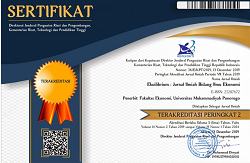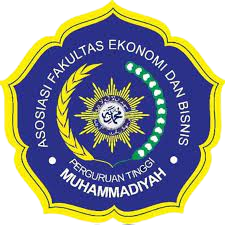The Effect of Enviromental Uncertainty and Tax Avoidance: The Role of Managerial Ability in Emerging Country
DOI: 10.24269/ekuilibrium.v18i1.2023.pp72-82
Abstract
Taxes play an essential role in state funding. As something that is not profitable for the company, it usually encourages efforts to reduce taxes by doing a tax avoidance. This study aims to determine the effect of environmental uncertainty on tax avoidance and to determine the managerial ability to weaken the effect of environmental uncertainty on tax avoidance. This study using SPSS, 458 samples used in this study are manufacturing companies listed on the Indonesia Stock Exchange in the period 2016 – 2020. The results of this study indicate that environmental uncertainty affects tax avoidance and managerial ability strengthens the effect of environmental uncertainty on tax avoidance. The result may be due to the large influence of environmental uncertainty in the company so that the risks obtained are difficult for managers to overcome.
Keywords
References
- Akbari, F., Salehi, M., & Vlashani, M. A. B. (2018). The relationship between tax avoidance and firm value with income smoothing: A comparison between classical and Bayesian econometric in multilevel models. International Journal of Organizational Analysis, 27(1), 125–148.
- Ali Akhmad Noor Hidayat. (2021, June 26). Penerimaan Pajak Industri Manufaktur Tumbuh 42,24 Persen Per Mei 2021. Tempo.Co.
- Aprisma, R., & Sudaryati, E. (2020). Environmental Uncertainty and Firm Performance: The Moderating Role of Corporate Governance. Jurnal Akuntansi, 24(2), 187–203.
- Arieftiara, D., Utama, S., Wardhani, R., & Rahayu, N. (2015). Analisis pengaruh strategi bisnis terhadap penghindaran pajak, bukti empiris di Indonesia. Simposium Akuntansi Nasional, 18(18), 1.
- Arieftiara, D., Utama, S., Wardhani, R., & Rahayu, N. (2019). Contingent fit between business strategies and environmental uncertainty: The impact on corporate tax avoidance in Indonesia. Meditari Accountancy Research.
- Astuti, T. P., & Aryani, Y. A. (2016). Tren penghindaran pajak perusahaan manufaktur di Indonesia yang terdaftar di BEI tahun 2001-2014. Jurnal Akuntansi, 20(3), 375–388.
- Bathala, C. T., & Rao, R. P. (1995). The determinants of board composition: An agency theory perspective. Managerial and Decision Economics, 16(1), 59–69.
- Bizer, D. S., & Judd, K. L. (1989). Taxation and uncertainty. The American Economic Review, 79(2), 331–336.
- Chen, X., Hu, N., Wang, X., & Tang, X. (2014). Tax avoidance and firm value: evidence from China. Nankai Business Review International, 5(1), 25–42.
- Dang, D., Fang, H., & He, M. (2019). Economic policy uncertainty, tax quotas and corporate tax burden: Evidence from China. China Economic Review, 56, 101303.
- Davila, T., & Wouters, M. (2005). Managing budget emphasis through the explicit design of conditional budgetary slack. Accounting, Organizations and Society, 30(7–8), 587–608.
- Demerjian, P., Lev, B., & McVay, S. (2012). Quantifying managerial ability: A new measure and validity tests. Management Science, 58(7), 1229–1248.
- Demerjian, P. R., Lev, B., Lewis, M. F., & McVay, S. E. (2013). Managerial ability and earnings quality. The Accounting Review, 88(2), 463–498.
- Dewi, S. N., & Haryanto, A. T. (2016). Pengaruh Ketidak Pastian Lingkungan Dan Orientasi Pasar Terhadap Kinerja Bisnis Dengan Inovasi Sebagai Varibel Mediator (Studi Pada Bank Perkreditan Rakyat Di Solo Raya). Ekuilibrium: Jurnal Ilmiah Bidang Ilmu Ekonomi, 11(2), 65–77.
- Djuitaningsih, T., & Rahman, A. (2012). Pengaruh kecakapan manajerial terhadap kinerja keuangan perusahaan. Media Riset Akuntansi, 1(2).
- Downey, H. K., Hellriegel, D., & Slocum Jr, J. W. (1975). Environmental uncertainty: The construct and its application. Administrative Science Quarterly, 613–629.
- Duncan, R. B. (1972). Characteristics of organizational environments and perceived environmental uncertainty. Administrative Science Quarterly, 313–327.
- Eisenhardt, K. M. (1989). Agency theory: An assessment and review. Academy of Management Review, 14(1), 57–74.
- Elsayed, K., & Paton, D. (2005). The impact of environmental performance on firm performance: static and dynamic panel data evidence. Structural Change and Economic Dynamics, 16(3), 395–412.
- Fernández-Rodríguez, E., & Martínez-Arias, A. (2012). Do business characteristics determine an effective tax rate? Evidence for listed companies in China and the United States. Chinese Economy, 45(6), 60–83.
- Francis, B., Sun, X., Weng, C.-H., & Wu, Q. (2013). Managerial ability and tax aggressiveness. China Accounting and Finance Review, 24(1).
- Frank, M. M., Lynch, L. J., & Rego, S. O. (2009). Tax reporting aggressiveness and its relation to aggressive financial reporting. The Accounting Review, 84(2), 467–496.
- Gallemore, J., & Labro, E. (2015). The importance of the internal information environment for tax avoidance. Journal of Accounting and Economics, 60(1), 149–167.
- Garg, M., Khedmati, M., Meng, F., & Thoradeniya, P. (2022). Tax avoidance and stock price crash risk: mitigating role of managerial ability. International Journal of Managerial Finance, 18(1), 1–27.
- Ghosh, D., & Olsen, L. (2009). Environmental uncertainty and managers’ use of discretionary accruals. Accounting, Organizations and Society, 34(2), 188–205.
- Hanlon, M., & Heitzman, S. (2010). A review of tax research. Journal of Accounting and Economics, 50(2–3), 127–178.
- Higgins, D., Omer, T. C., & Phillips, J. D. (2015). The influence of a firm’s business strategy on its tax aggressiveness. Contemporary Accounting Research, 32(2), 674–702.
- Huang, H., Sun, L., & Zhang, J. (2017). Environmental uncertainty and tax avoidance. In Advances in taxation (Vol. 24, pp. 83–124). Emerald Publishing Limited.
- Hutchens, M., Rego, S. O., & Williams, B. (2020). Tax avoidance, uncertainty, and firm risk. Uncertainty, and Firm Risk (June 2020).
- Jensen, M. C., & Meckling, W. H. (2019a). Theory of the firm: Managerial behavior, agency costs and ownership structure. In Corporate Governance (pp. 77–132). Gower.
- Jensen, M. C., & Meckling, W. H. (2019b). Theory of the firm: Managerial behavior, agency costs and ownership structure. In Corporate Governance (pp. 77–132). Gower.
- Jingga, V., & Lina, L. (2017). Factors influencing tax avoidance activity: an empirical study from indonesia stock exchange. Indian-Pacific Journal of Accounting and Finance, 1(1), 17–25.
- Jiraporn, P., Leelalai, V., & Tong, S. (2016). The effect of managerial ability on dividend policy: how do talented managers view dividend payouts? Applied Economics Letters, 23(12), 857–862.
- Jusman, J., & Nosita, F. (2020). Pengaruh corporate governance, capital intensity dan profitabilitas terhadap tax avoidance pada sektor pertambangan. Jurnal Ilmiah Universitas Batanghari Jambi, 20(2), 697–704.
- Khan, M., Srinivasan, S., & Tan, L. (2017). Institutional ownership and corporate tax avoidance: New evidence. The Accounting Review, 92(2), 101–122.
- Khurana, I. K., Moser, W. J., & Raman, K. K. (2018). Tax avoidance, managerial ability, and investment efficiency. Abacus, 54(4), 547–575.
- Koester, A., Shevlin, T., & Wangerin, D. (2017). The role of managerial ability in corporate tax avoidance. Management Science, 63(10), 3285–3310.
- Lam, S. S. K., & Yeung, J. C. K. (2010). Staff localization and environmental uncertainty on firm performance in China. Asia Pacific Journal of Management, 27, 677–695.
- Lin, Y., Zhao, S., & Li, N. (2014). A study of network-building HR practices for TMT, strategic flexibility and firm performance: The moderating role of environmental uncertainty. Nankai Business Review International.
- Listiyowati, L., Indarti, I., Wijayanti, F., & Setiawan, F. A. (2021). Kepatuhan Wajib Pajak UMKM di Masa Pandemi COVID-19. Jurnal Akuntansi Indonesia, 10(1), 41–59.
- McGuire, S. T., Omer, T. C., & Wilde, J. H. (2014). Investment opportunity sets, operating uncertainty, and capital market pressure: determinants of investments in tax shelter activities? The Journal of the American Taxation Association, 36(1), 1–26.
- Natasha, I., & Yustina, A. I. (2020). Causal Relations Between Knowledge, Norms, and Tax: A Study of Gender Differences on Taxpayers. Ekuilibrium: Jurnal Ilmiah Bidang Ilmu Ekonomi, 15(1), 14–26.
- Ng, S., & Daromes, F. E. (2016). Peran kemampuan manajerial sebagai mekanisme peningkatan kualitas laba dan nilai perusahaan. Jurnal Akuntansi Dan Keuangan Indonesia, 13(2), 4.
- O’Donovan, J., Wagner, H. F., & Zeume, S. (2019). The value of offshore secrets: Evidence from the Panama Papers. The Review of Financial Studies, 32(11), 4117–4155.
- Otusanya, O. J. (2011). The role of multinational companies in tax evasion and tax avoidance: The case of Nigeria. Critical Perspectives on Accounting, 22(3), 316–332.
- Park, J., Ko, C. Y., Jung, H., & Lee, Y.-S. (2016). Managerial ability and tax avoidance: evidence from Korea. Asia-Pacific Journal of Accounting & Economics, 23(4), 449–477.
- Phillips, J., Pincus, M., & Rego, S. O. (2003). Earnings management: New evidence based on deferred tax expense. The Accounting Review, 78(2), 491–521.
- Puspita, D., & Febrianti, M. (2017). Faktor-faktor yang memengaruhi penghindaran pajak pada perusahaan manufaktur di bursa efek Indonesia. Jurnal Bisnis Dan Akuntansi, 19(1), 38–46.
- Schellhorn, C., & Sharma, R. (2013). Using the Rasch model to rank firms by managerial ability. Managerial Finance, 39(3), 306–319.
- Seviana, A. A., & Kristanto, A. B. (2020). Ketidakpastian lingkungan dan tendensi agresivitas pelaporan keuangan versus pajak: Efek moderasi kecakapan manajerial. Jurnal Ilmiah Akuntansi Dan Humanika, 10(1), 1–11.
- Sun, W., & Price, J. M. (2016). The impact of environmental uncertainty on increasing customer satisfaction through corporate social responsibility. European Journal of Marketing, 50(7/8), 1209–1238.
- Uğurlu, M., & Aksoy, H. (2006). Prediction of corporate financial distress in an emerging market: the case of Turkey. Cross Cultural Management: An International Journal, 13(4), 277–295.
- Walsh-Führing, M. (2018). The Panama Papers: breaking the story of how the rich and powerful hide their money. Oxford University Press.
- Wardani, D. K., & Pricillia, R. M. (2019). Effect of Corporate Social Responsibility (Csr), Profitability, and Profit Management on Tax Evasion. Ekuilibrium: Jurnal Ilmiah Bidang Ilmu Ekonomi, 14(1), 56–67.
- Yu, C., Wang, F., & Brouthers, K. D. (2016). Competitor identification, perceived environmental uncertainty, and firm performance. Canadian Journal of Administrative Sciences/Revue Canadienne Des Sciences de l’Administration, 33(1), 21–35.
Refbacks
- There are currently no refbacks.

This work is licensed under a Creative Commons Attribution-ShareAlike 4.0 International License.













